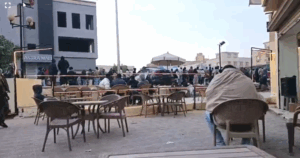Sudan timeline Oct-Dec 2019: Interim government put to the test
As Sudan marks the first anniversary of the December revolution, the Sovereign Council and interim government – a tenuous exercise in military-civilian cooperation – is being put to the test by situations within the country, which can often be traced to the legacy of the deposed Al Bashir regime.
 WFP Executive Director, David Beasley, with SPLM-N leader Abdelaziz El Hilu in the Nuba Mountains, South Kordofan, October 23, 219 (RD)
WFP Executive Director, David Beasley, with SPLM-N leader Abdelaziz El Hilu in the Nuba Mountains, South Kordofan, October 23, 219 (RD)
As Sudan marks the first anniversary of the December revolution, the Sovereign Council and interim government – a tenuous exercise in military-civilian cooperation – is being put to the test by situations within the country, which can often be traced to the legacy of the deposed Al Bashir regime.
On the positive side, the Sudanese public are getting used to being able to stage peaceful protests in relative freedom.
Announcements that the entire education system in Sudan is to be overhauled and restructured to reflect the new reality in the country, have been welcomed almost universally.
There is less fear for security in many parts of the country, however clashes between civilians displaced by many years of civil war and marauding militiamen still plague Darfur especially. Most recently, attacks on camps for the displaced and villages near El Geneina, capital of West Darfur, have left more than 70 dead and wounded.
The peace talks in the South Sudanese capital of Juba are ongoing, and progress is evident in several of the negotiation tracks.
The Juba dialogue has also eased tensions between the government and the rebels who hold much of the Two Areas (South Kordofan and Blue Nile state). This has enabled international organisations such as the World Food Programme to bring-in vital humanitarian aid for the first time in many years.
The eyes of Sudan are on Khartoum to ensure that the interim government of Prime Minister Abdallah Hamdok remains true to the ideals of the revolution. Government efforts to dismantle the ‘deep state’ by replacing affiliates of the former regime in positions of power are under scrutiny at home and abroad.
Naysayers, especially Islamic fundamentalists hankering back to the former regime, are being called to account, and their media channels gagged.
An increasing number of voices within Sudan are joining calls by the international community to transfer deposed dictator Omar Al Bashir and his co-accused cronies to The Hague to face charges of war crimes, genocide, and crimes against humanity.
Al Bashir has already been convicted of currency offences, and given a custodial sentence by a Khartoum court, but as he still faces charges in Sudan, he remains incarcerated in the notorious Kober prison in Khartoum North, where so many of his opponents were detained and tortured during the 30 years of his repressive regime.
As the revolution enters its second year, the Sudanese economy still shows little sign of recovery. Challenges on that front for the next year will be for the government to regain full control of the country’s gold mines, retrieve the ill-gotten gains of Al Bashir and his cadres, and to convince the international community – and the USA in particular – to remove Sudan from the list of State Sponsors of Terrorism.
Timeline Sudan October-December 2019
October: Affiliates of Al Bashir replaced, peace talks resume
October 1: Prime Minister Abdallah Hamdok meets with the French President in Paris. Hamdok also meets Abdelwahid El Nur, the chairman of the mainstream Sudan Liberation Movement. Radio Dabanga interviews Hamdok, who expresses strong support for the Sudanese media outlet abroad: “Its place is now inside Sudan”.
October 2: France will support debt relief for Sudan. Two generals arrested for planning a coup d’état in July are released.
October 3: The new head of the European Union Delegation to Sudan arrives in Khartoum. The Sudan Revolutionary Front rebel alliance organises a conference in Cairo in cooperation with Sudanese opposition parties and civil society organisations, in order to unify their stances concerning the peace process.
October 4: US Assistant Secretary of State Tibor Nagy says that removing Sudan from the list of countries that sponsor terrorism will take time. A professor of International Law at the University of Khartoum urges legal and institutional reform before starting with transitional justice procedures.
October 6: The Prime Minister dismisses 28 heads of state university boards and 35 university rectors and four deputies. South Kordofan anti-mining protesters clash with militiamen of the Rapid Support Forces (RSF) who are guarding gold mines in the state.
October 7: Demonstrators in Talodi in South Kordofan continue their vigil against the use of cyanide in gold mining. Calls on Sudan’s government to extradite Omar Al Bashir to the International Criminal Court (ICC).

October 8: RSF militiamen attacked people living near gold mines in Talodi.
October 9: The Forces for Freedom and Change (FFC) announce that the government is working silently to remove all figures of the former regime in ministries and the states. The FFC says it will name civilian replacements for the military state governors this month. Sudan’s Council of Ministers outlaws the use of toxics in mining.
October 10: Woman judge Nemat Abdallah gazetted as new Chief Justice. Prime Minister Abdallah Hamdok, who recently visited Saudi Arabia and the United Arab Emirates, arrives in Addis Ababa to hold talks with Ethiopian officials and representatives of the International Authority on Development (IGAD) trade block. Staff of the Sudan News Agency demand restructuring ‘to reflect Sudan’s new reality’. Security forces continue to abuse emergency measures in South Kordofan.
October 11: Demonstrations calling for peace and justice all over Sudan. The Minister of Youth and Sports files a lawsuit against an Imam in Khartoum who denounced women football in a number of fatwas.
October 13: El Sadig El Mahdi, head of the National Umma Party (NUP) warns that “the current transitional regime is deadlocked” because of conspiracies by former regime members, opportunistic foreign interventions, and the economic crisis.
October 14: Start of the second round of the peace talks between the Sudanese government and armed movements. Five rebel factions merge into the Sudanese Alliance for Change. The Sudanese government’s decision to forbid the use of toxics in gold mining is met with mixed reactions. The Darfur Women Action Group presents a ‘Strategic Framework for Sustainable Change‘ in Sudan.
October 15: South Sudanese President Salva Kiir brokering the Sudanese peace talks calls on the African Union to support the transition in Sudan. Sudanese journalists, lawyers demand removal of corrupt trade union leaders. University of Khartoum to resume studies this month.
October 16: Sudan’s newly appointed Attorney General Tajelsir El Hibir takes the Oath of Office, pledges that Rule of Law will prevail in the country. The Minister of Culture and Information announces there will be “no censorship“ at the 15th Khartoum International Book Fair.
October 17: The Sudanese Congress Party criticises Khartoum, Juba, and Sudan’s armed movements for not inviting the Forces for Freedom and Change (FFC) to join the ongoing peace talks. A military court bans media coverage of the trials of those accused of involvement in the foiled coup attempt in July.
October 18: Severe bread crisis in Atbara in Rive Nile state. An activist in eastern Sudan’s El Gedaref files a complaint against the former state security director for murder and torture. SPLM-N El Hilu and Khartoum agree on a roadmap for the peace process in South Kordofan.
October 20: The Ministry of Labour and Social Development to carry out economic and social surveys to determine the extent of poverty in the country.
October 21: The SRF and Khartoum sign an agreement paving the way for peace talks on Darfur and Blue Nile state. Thousands of Sudanese take to the streets to mark the 55th anniversary of the 1964 ‘October Revolution’. Armed robbers pillage five villages in South Darfur. Military Intelligence agents in South Kordofan detain people suspected of supporting the rebel movement in the state. Islamist students attack pro-democracy students in Khartoum North. Teachers in Northern State accuse the Department of Education of intimidation. South Kordofan protests against toxins, militia presence continue.

October 22: Sudan’s peace negotiations are adjourned for one month to give the parties time for consultations. The Sudanese Pound hits a new low against hard currencies. Aid by the UN World Food Programme (WFP) revives Sudan-South Sudan river shipping. Five Sudanese policemen are officially accused of torturing a man to death in Omdurman. The international Friends of Sudan has expressed strong support for Sudan’s government’s plan to reform the country’s economy.
October 23: Khartoum grants permission to the WFP to access rebel-held areas in South Kordofan. An independent Committee of Inquiry headed by lawyer Nabil Adib will investigate the violent used against protestors during the uprising. Activists lament the absence of women in the committee. Civil servants in Darfur officially accuse the Darfur Peace Office of corruption. A Muslim extremist vandalised the Khartoum Book Fair stand devoted to books from and about the late Islamic reformer Mahmoud Mohamed Taha.
October 24: The immunity of members of Sudan’s now defunct National Intelligence and Security Services (NISS) will be lifted. Doctors in Nyala, South Darfur strike in protest against an attack, allegedly by RSF militiamen. The Sudanese-South Sudanese Joint Boundary Demarcation Commission agreed on the full delimitation of the boundaries between the two countries. Darfur genocide specialist Prof Eric Reeves announces he will stop publishing articles on Sudan’s war-torn western region.
October 25: Leaders of the Sudan Liberation Movement faction led by Minni Minawi travel to Khartoum to intensify their contact with political forces in the country. The chairman of the Sovereign Council says Sudan will continue its economic and military cooperation with Russia.
October 26: The Sudanese Professionals Association criticises the participation of Sovereign Council members in an RSF militia campaign against cholera in the country.
October 27: Abdelaziz El Hilu, head of the SPLM-N faction in South Kordofan welcomes the Sovereign Council’s authorisation of a World Food Programme visit to the rebel stronghold in Kauda. Organisations and activists working in the field of childcare demanded that the government establish a Commission for the Rights of the Child as a matter of priority.
October 28: The US Dollar rate rose to SDG 76 on the parallel market. The Sudanese government and the Forces for Freedom and Change welcome the arrival of the SLM-MM to the country. Followers of former janjaweed leader Musa Hilal hold a vigil in Khartoum demanding his release. The Sovereign Council agreed to review the cases of members of the armed movements detained across the country.
October 29: The El Gezira and El Managil Farmers Alliance reports that 80 percent of this year’s cotton production has failed due to pests. The University of El Fasher opens a Human Rights Knowledge Centre in cooperation with the UNDP. Sudanese police assert that former janjaweed leader Musa Hilal has been arrested for criminal charges. RSF militiamen reportedly contaminated water in Talodi, South Kordofan. Doctors in Sudan’s River Nile state strike over lack of medical basics.
October 30: The Sudan Revolutionary Front rebel alliance has requested the Prime Minister to postpone the selection process of state governors and the Parliament until a comprehensive peace has been reached. Protestors in Port Sudan demand the dismissal of Haya locality officials, accusing them of negligence. Water and oil are leaking from a West Kordofan oil well.
October 31: A high-level EU delegation visits Sudan to discuss cooperation, and pledges €466 million in support grants to assist the transition in the country. Sudan’s Attorney General says he will prosecute perpetrators of major human rights violations committed since 1989, when Al Bashir took power in a military coup.

November: Sudanese continue exercising their right to protest
November 1: The UN Security Council agreed to extend the mandate of the UN-AU Mission in Darfur (Unamid) until 31 October 2020. Friends of Sudan agree on financing the country’s 2020 budget and debt relief. Sudanese lawyers and civil society activists call on the AU to provide technical assistance to Sudan’s Transitional Government and establish an office in Khartoum. The Ministry of Information and Culture began listing media institutions owned by former state officials. Angry protesters torch the offices of the West Darfur General Intelligence Service (GIS), after a young man was allegedly tortured by RSF militiamen.
November 3: The EU delegation that visited Khartoum last week quizzed Sudan’s Attorney General about the extradition of ousted President Al Bashir to the ICC. Three suspects are held after two farmers were gunned down on their farm in North Darfur. According to political analyst El Haj Warrag, racism forms the root of human rights violations in Sudan.
November 4: The Sudan Armed Forces denied claims by the El Houthi group that more than 4,000 Sudanese troops have been killed since Sudan’s involvement in the Yemen war. The Prime Minister is visiting North Darfur today – his first visit to a Sudanese state since he assumed office on August 21. The value of the Sudanese Pound continues to drop against major international currencies, despite economic revival plans. A delegation of the South Sudanese mediation team visits Khartoum for consultations about the Sudanese peace talks. Sudan’s Minister of Culture guarantees press freedom in the country.
November 5: PM Abdallah Hamdok vows to achieve transitional justice in Darfur. People in El Abbasiya in South Kordofan protest against police violence. Residents of West Kordofan’s Babanusa call for improved basic services in the state. Sudan’s media laws are to be amended within six months. The FFC say that Omar Al Bashir should be transferred to the ICC after he has been tried in Khartoum for corruption. Herders attack farmers in North and Central Darfur.
November 6: More than seven million people in Sudan suffer from hunger, 85 percent of them are pastoralists. The South Darfur Land Conference requests the registration of land be stopped until the peace process has been completed. North Darfur school students demonstrate to support the teachers strike in El Fasher.
November 7: Sudan’s Foreign Minister meets US President Donald Trump in Washington. Sweden commits support to economic regeneration in Sudan. The downward slide of the Sudanese Pound against hard currencies is showing no signs of recovery. The Ministry of Culture pledged that crimes committed against journalists under the former regime will not pass without accountability. The FFC in El Obeid in North Kordofan protest the deteriorating health care in the state.
November 8: Sudan’s Minister of Finance says the dire situation in the country requires the lifting of US sanctions on Khartoum. The Sudan Revolutionary Front rebel alliance says Khartoum may appoint temporary state governors until a peace accord is reached. The North Darfur Land Conference recommends the review of all laws concerning land use and ownership.
November 10: The Central Bank of Sudan freezes bank accounts of 40 prominent officials of the former regime. New evidence may further condemn former revenue head of Sudan’s Presidential Palace. The Sudan Workers Union demands an increase in the minimum monthly salary to SDG 8,778 ($195). At the Sudan Partners Forum in Khartoum, Finance Minister Ibrahim El Badawi requests support for his plans to address the economic problems in the country. Herders shoot at farmers in North Darfur’s Tawila.
November 11: PM Abdallah Hamdok meets with EU Commissioners in Brussels. The UN accuses a number of member states, including Sudan, of violating the Libya arms embargo. Sudan’s educational budget will be substantially increased. A number of Darfur and South Kordofan former rebel factions join forces to complete the peace process in the country. Herders again attack farmers in North Darfur’s Tawila.

November 12: The Swiss government contributes $2 million to support livelihoods in Darfur. The Secretary General of the Arab League discusses the Sudanese peace talks with rebel leader. The Islamist Popular Congress Party urges the government to ratify the Rome Statute and hand over Omar Al Bashir to the ICC. Seasonal labourers in El Gezira demand better housing and services, attribute neglect by former state governments to racism.
November 13: Women activists meet with Sovereign Council member Mohamed El Taayshi, demanding the participation of women in the peace negotiations. The International Organisation for Migration (IOM) will re-register all displaced people in the North Darfur camps. The Communist Part of Sudan demands the government take control of the Jebel Amer gold mines in North Darfur. Students in South Darfur protest the continuing lack of transportation.
November 14: The Sudanese army wishes to end the appointment of generals as acting state governors, contrary to what has been agreed with rebel leaders during the peace talks. Sudan’s new Chief Justice says she does not have the competence to refer Al Bashir to the ICC. A high-level UN delegation visits El Fasher, capital of North Darfur. Groups of herders assault farmers in various places in North Darfur.
November 15: Washington will cooperate with Khartoum to successfully complete the three-year transitional period. The conference on Legal Reform of Land Use in Darfur recommends the amendment of all land laws. Hundreds of demonstrators in Khartoum demand a “speedy solution” to the transportation crisis in the city.
November 17: Sudan’s Attorney General calls for the investigation of the extrajudicial killing of army officers in 1990. Displaced leaders in Central Darfur tell the UN delegation visiting Zalingei that Al Bashir and other former leaders must be handed to the ICC in The Hague. According to Malik Agar, head of the SPLM-N faction in Blue Nile state, Darfur should be granted autonomy.
November 18: According to Lt Gen Abdelfattah El Burhan, head of Sudan’s Sovereign Council, women should lead the peace process in the country. Fatal attacks on protestors in June could amount to crimes against humanity, Human Rights Watch says in a new report. Several protestors are injured when the police break up a rally calling for the removal of El Gezira’s acting governor. In Zalingei, capital of Central Darfur, activists protest the seizure of a piece of land by the acting governor.
November 19: Tribal clashes erupt in Port Sudan, capital of Red Sea state between supporters and opponents of the head of the United Popular Front who returned to the city after a long exile.
November 20: Unamid officially hands over its Nyala Camp, one of the largest bases of the UN-AU Mission in Darfur, to the Sudanese government. Rival tribes in Port Sudan sign a peaceful coexistence accord. Activists in Khartoum protest recent violence used by the authorities against peaceful demonstrators in El Gezira and Khartoum.
November 21: Prime Minister Hamdok visits Port Sudan. Popular Congress Party leader Ali El Haj is arrested for his role in the 1989 military coup that brought Al Bashir to power. The Unamid Head of Mission calls on hold-out rebels to join Sudan peace talks. On the occasion of World Children’s Day, dozens of children demonstrate in Khartoum, demanding a children’s commission that will guarantee their rights. Army soldiers and RSF militiamen clash in Central Darfur market.
November 22: Prices of locally grown staple foods in Sudan begin to decline with the start of the harvest. More than 200 students of the University of Dongola resign in protest against “racist conduct“ of the university administration. The Ministry of Interior Affairs investigates the practice of illegally granting the Sudanese nationality to foreigners. Hundreds of supporters of Al Bashir call for the release of detained former government officials.
November 23: A Darfur activist network urges Gen Mohamed Hamdan ‘Hemeti’, Deputy Head of the Sovereign Council and Commander-in-Chief of the Rapid Support Forces to stop the ongoing violence against farmers and villagers in the region.
November 24: Lt Gen Abdelfattah El Burhan says that the government will not transfer ousted President Al Bashir to The Hague. The Sudanese army denounces a report by Human Rights Watch that asserts that fatal attacks on protestors in June “were planned”. The Humanitarian Aid Commission has revoked the registration of 28 institutions affiliated with the defunct Al Bashir regime and the Muslim Brotherhood. The people of Sudan must learn to appreciate their diversity, the Minister of Religious Affairs says.
November 25: The UN humanitarian chief calls on the international community to act faster to scale up humanitarian support to Sudan, as the situation is deteriorating for millions of people. Demonstrators in various places in Sudan call for the removal of affiliates of Al Bashir’s National Congress Party from state institutions, improvements at the university, or protest high tuition fees charged by schools.
November 26: The Ministry of Education decides to overhaul the educational ladder and curriculum. The government will give top priority to the investigation of arbitrarily dismissals from Sudan’s civil service during the Al Bashir regime. Members of the Popular Defence Forces militia attack people in Habila in South Kordofan while police and the army remain silent. The Khartoum Culture Festival in the name of the victims of the June 3 massacre, is marred by protests because of the participation of a representative of the RSF militia.
November 27: Members of the Revolutionary Awakening Council (RAC), founded by former janjaweed leader Musa Hilal demonstrate in Khartoum and several towns in Darfur, calling for his release. School students in Nyala continue their protest against the transport crisis. University students in El Gezira demand the dissolution of the Student Welfare Fund. Two North Darfur farmers are wounded in a herder attack.
November 28: Political parties and armed movements demand restructuring of the FFC. The Minister of Religious Affairs says that the new civil Sudan aims to take care of the interests of citizens, Muslims and Christians alike.
November 29: The Sudanese government decides to disband the National Congress Party (NCP) established by ousted President Al Bashir and cancel the Public Order laws. Social media activists in Khartoum say they have repeatedly been harassed by the authorities while covering events in the city. NCP supporters clash with members of the Forces of Freedom and Change in West Kordofan. Herders raid Kendebe village in West Darfur.
December: Herders’ attacks on farmers continue in Darfur, more ‘deep state’ elements removed
December 1: The assets of the dissolved NCP in Sudanese banks are estimated at ‘trillions of Pounds‘. The University of Khartoum accuses Islamic fundamentalist Mohamed El Jazouli of insulting the University’s administration and inciting violence. Gunmen attack a village near Sirba in West Darfur.
December 2: Sudan’s Prime Minister travels to the USA with a high-level Sudanese delegation to discuss the lifting of the US and UN sanctions against Sudan. Chief Justice Nemat Abdallah announces the release of 1,012 prisoners in Khartoum state. Unamid discusses peace projects and its scheduled withdrawal from Darfur next year with federal and Darfur institutions. A poll conducted by Al Jazeera live on Facebook shows that 84 percent of the respondents support the dismantling of the former regime. In Khartoum, hundreds of Sudanese celebrate the dissolution of the NCP. Militant herders kill two farmers in North Darfur.
December 3: Delegations from the SPLM-N Agar and the Kush Alliance arrive in Khartoum ‘to push forward the spirit of partnership with the transitional government’. Journalists call for the removal of affiliates of the former regime in the Ministry of Culture and Information. Doctors at the Bashayer Hospital in Khartoum strike after two doctors were assaulted by policemen. Gunmen shoot four people in separate incidents in Darfur.
December 4: The UN and Sudan will exchange ambassadors after a 23-year gap. PM Hamdok states in an US interview that ‘anybody’ responsible for atrocities in Sudan must be held accountable, including ‘Hemeti’. Relatives of protestors killed demonstrate in Khartoum demanding that a committee ‘of international standards’ investigates the murders. Carrying edged weapons is banned in Red Sea state. A Dutch delegation visiting Darfur says the attacks on farmers in the region illustrate the lack of enforcement of the Rule of Law. An RSF militia captain has been sentenced to death for murdering a man in West Darfur.
December 5: UN’s counterterrorism chief commends Sudan for initiative in detection, interdiction of terrorists. Four people are killed when gunmen clash at a South Darfur market. According to a member of the FFC Peace Committee, the current peace talks are hampered by unclarity about the negotiation platform.
December 6: Chadian President Idris Deby receives a delegation from Sudan’s Sovereign Council, and meets with members of the Sudan Revolutionary Front rebel alliance. Sudanese lawyers file a complaint against Al Bashir and other leaders of the former regime for ordering the killing of demonstrators. A Khartoum medical convoy travels to the Nuba Mountains to offer free treatment to war victims in the region.
December 8: The South Sudanese mediation team reports that the preparations for the third round of Sudanese peace negotiations have been finalised. SPLM-N El Hilu says its negotiation team is ready to engage in direct peace talks with the Sudanese government. Prime Minister Hamdok is optimistic about overcoming Sudan’s crises after ‘successful meetings’ in the USA. The Minister of Finance establishes a national committee to assess the salaries of state employees for 2020. People in Central Darfur demonstrate against the increasing violence in the region.

December 9: Residents of North Darfur’s Kabkabiya protest the ongoing violence against farmers by herders and members of the RSF militia.
December 10: The third round of the Sudanese peace negotiations kicks off in Juba. Police in White Nile state detain activists protesting against the administration of the Kenana Sugar Company. Five people who went missing during the violent dismantling of the Khartoum sit-in on June 3 are still unaccounted for. Unidentified gunmen attack farmers, rape girl in Central Darfur. Sudanese army soldiers injure 15 people in Kassala. According to Global Witness, the RSF militia has huge interests in many sectors of the Sudanese economy, including gold mining and trade.
December 11: The chairman of the Sovereign Council instructs the formation of a committee to remove remnants of the former regime and recover embezzled money. The public prosecutor in Khartoum questions deposed President Al Bashir about the 1989 military coup that brought him into power.
December 12: Rebel leader Abdelaziz El Hilu reports an ‘optimistic mood‘ at the Sudanese peace talks in Juba. The Prime Minister calls on the Friends of Sudan for support to overcome challenges facing the transition process. Another prominent Popular Congress Party leader is detained for his role in the 1989 military coup. People in Tawila, North Darfur, demonstrate against the recurrent herder attacks in the area. In South Kordofan, a farmer is killed by militiamen of the Popular Defence Forces. UNDP and the University of Khartoum launch the 2019 global Human Development Report.
December 13: The first session of direct peace talks between the Sudanese government and rebel movements starts in Juba. SPLM-N El Hilu demands secularism and self-determination. Renewed tribal clashes break out in Port Sudan, capital of Red Sea state. Darfur women demand gender balance in Sudan’s government. The second wife of Al Bashir is arrested for illegal ownership of wealth. Students of the University of El Fasher in North Darfur protest the lack of bread and transportation. The Sentry urges Washington to accelerate lifting Sudan from its ‘terrorism list’.
December 14: Al Bashir is sentenced for corruption to two years imprisonment.
December 15: The Sudan Revolutionary Front rebel alliance and the forces for Freedom and Change discuss the possibility of the FFC participating in the Juba talks. Mass rallies are held in Khartoum and several other states in the country to mark the anniversary of the December revolution. In West Darfur, people demonstrate against the growing violence in the region. Angry protesters in El Gedaref block the Sudan-Ethiopia border, demanding protection from attacks by Ethiopian gunmen.
December 16: The negotiating parties extend the Juba Declaration of Principles, which includes a cease fire, for two months. Charges are being prepared leaders of the former regime for crimes against humanity committed between 1989 to 2019. ‘Hemeti’, Deputy chairman of the Sovereign Council and Commander of the RSF government militia will reportedly hand over the gold mines in North Darfur’s Jebel Amer to the Sudanese government. El Sadig El Mahdi,, calls for an end to hostilities against ‘Hemeti’. The Ministry of Industry will list all factories in Sudan, as part of the government’s plans to stimulate the economy.
December 17: Peace negotiations in Juba focus on the main issues schedule in order to reach an agreement before February 15, 2020. Central Bank of Sudan freezes assets of trade unions and the Employers Union because of their affiliation with the former regime. A government delegation headed by Hamdok arrives in N’Djamena, capital of Chad, for a two-day visit. The National Committee for Environment Protection says the government of Al Bashir never reacted to its petitions against toxic substances used by mining companies in the country. The No Oppression Against Women Initiative organises a rally in Omdurman. Sudanese refugees in Niger stage a protest against long neglect.
December 18: Khartoum and the SPLM-N Agar faction sign a ‘humanitarian protocol‘ in Juba. The US software company Oracle will introduce a mobile banking system to Sudan. The governor of South Darfur discusses Dutch projects with a delegation from the Netherlands. University students in East Darfur protest against badly maintained dormitories after a student drowned in a ground water tank. Farmers protest in El Fasher, capital of North Darfur, against repeated attacks on their farms.
December 19: The Executive Director of the WFP visits Blue Nile state as humanitarian aid arrives from South Sudan. The ICC Prosecutor urges the ending of impunity for atrocities in Darfur. The main stakeholders of the peace talks in Juba, the marginalised people themselves, will be involved in the negotiations. The No Oppression Against Women Initiative again calls for the inclusion of women in the peace process. According to the RSF, “an invisible group disguising itself as RSF militiamen“ are responsible for attacks on protestors during the uprising. The capital of North Darfur witnesses a demonstration against herders’ attacks on farmers. The chairman of the Sovereign Council receives Darfur displaced in Khartoum.
December 20: Thousands of Sudanese commemorate the first anniversary of the December revolution. The rebel groups in Juba submit framework papers for talks on Darfur and the Two Areas (South Kordofan and Blue Nile state). The Public Prosecution will investigate all complaints concerning political crimes since 1989. Eastern Sudanese community leaders attending the peace talks in Juba propose a separate peace conference for the east, to be held inside Sudan.
December 21: Khartoum and rebel groups negotiating peace in Juba reach an understanding on the central Sudan track. Thousands of displaced people who fled armed conflict in Sudan’s peripheries, are surviving in the open in Khartoum.
December 22: The Sudanese government signs a $20 million programme with the UN Secretary-General’s Peacebuilding Fund. Khartoum and Darfur rebel groups agree on the participation of war victims in the Sudanese peace talks. The South Kordofan government and the SPLM-N El Hilu agree to open a number of roads for traffic and humanitarian aid in the Nuba Mountains.
December 23: Sudan’s Attorney General charges Al Bashir and 54 other prominent members of his regime with crimes committed in Darfur since 2003. The independent committee tasked with investigating the violent break-up of the Khartoum sit-in on June 3, kicks off. The 2020 draft budget will cut fuel subsidies and raise salaries. The poorest Sudanese will receive direct subsidies. The South Sudanese mediation team in Juba reports progress in all five Sudanese negotiation tracks. El Burhan, Commander-in-Chief of the Sudan Armed Forces and chairman of the Sovereign Council, confirms that the RSF militia forms an integral part of the country’s army.
December 24: The Sudan Revolutionary Front agrees with Khartoum to include 200 displaced people from Darfur in the Juba talks. Darfuri farmers report that at least 50 farmers were killed and injured in attacks in South and North Darfur in November and December. Sudan and South Sudan sign an extension of the joint oil agreement.
December 25: The Sudanese government and rebels in Juba sign a final accord on the central Sudan track. The security situation in Abyei is deteriorating rapidly. Peace talks on the eastern Sudan track have been suspended to allow for a stakeholders’ conference to resolve their differences. The Minister of Religious Affairs says he will root out corruption in his ministry. The International Monetary Fund urges Khartoum to take bold decisions to stabilise the economy in the country.

December 26: Thousands of people in Khartoum commemorate the first anniversary of the massive anti-Al Bashir march organised by the Sudanese Professionals Association. The peace negotiations in Juba are close to agreements on all tracks. NUP chairman El Sadig El Mahdi, warns that the Juba negotiations will not achieve peace. Prosecutors again question the second wife of Al Bashir about her assets. In his Christmas speech, the Minister of Religious Affairs apologises to Christians for “the unjust policies” they were subjected to during the deposed Al Bashir regime.
December 27: In Juba, the northern Sudan track is discussed between Khartoum and the Sudan Revolutionary Front, while the SPLM-N El Hilu requests a suspension of two weeks to consult its followers. PM Hamdok pledges to restructure Sudan’s armed forces. A delegation of the Ministry of Energy and Mining visits oil fields in West Kordofan and East Darfur, as part of a government campaign to improve the situation in the states. Ethiopian gunmen wreak havoc again at the Ethiopian-Sudanese border.
December 29: A disarmament and anti-smuggling campaign starts in North Darfur. According to rebel leader Abdelaziz El Hilu, the issue of national identity is the primary cause of the wars in Sudan.
December 30: Darfuris demonstrate in Khartoum, demanding Al Bashir and other former leaders be handed over to the ICC. The El Gezira Farmers Alliance demand the extensive irrigation system in the state be revived. The FFC in South Darfur accuse the state government of being behind the plundering of the former Unamid base in Nyala last week.
December 31: Attacks on camps for the displaced and villages near El Geneina, capital of West Darfur, leave more than 70 dead and wounded. In response, the rebels negotiating peace in Juba suspend the talks. A Sudanese court has sentenced 29 security officers to death for torturing an eastern Sudanese teacher to death in February. The Minister of Culture silences El Andalus Media Company.
Previous timelines:
May 2019: How did civil discontent propel Sudan towards the overthrow of Al Bashir?
August 2019: Sudan uprising: Timeline of tumultuous change
October 2019: Sudan: Turbulent transformation from tyranny
.
Radio Dabanga’s editorial independence means that we can continue to provide factual updates about political developments to Sudanese and international actors, educate people about how to avoid outbreaks of infectious diseases, and provide a window to the world for those in all corners of Sudan. Support Radio Dabanga for as little as €2.50, the equivalent of a cup of coffee.












 and then
and then